
Find Help
More Items From Ergsy search
-

Is it possible to be allergic to the sun?
Relevance: 100%
-

Does Ozempic cause allergic reactions?
Relevance: 46%
-

Can UK spiders cause allergic reactions?
Relevance: 46%
-
Is pre-tanning in a sunbed a good way to prepare my skin for sun exposure?
Relevance: 44%
-

What is Sunburn?
Relevance: 21%
-

Can sunburn be prevented?
Relevance: 20%
-
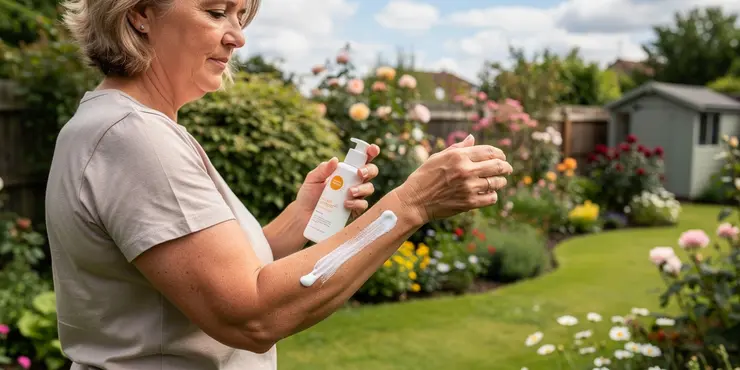
What are the long-term effects of sunburn?
Relevance: 20%
-

Can makeup with SPF replace sunscreen?
Relevance: 20%
-
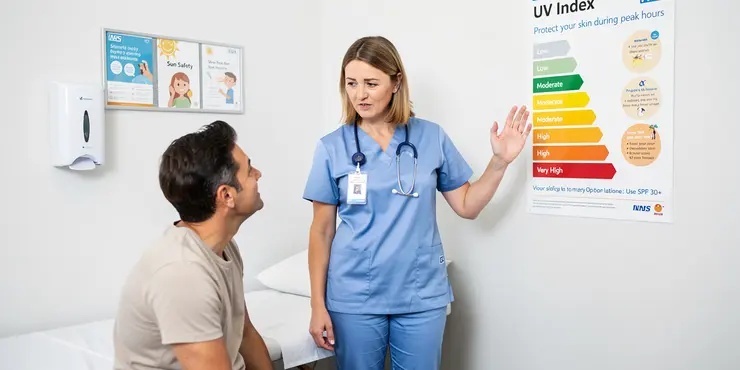
At what time of day is the sunburn risk highest?
Relevance: 19%
-

What SPF should I use if I am going to be outdoors all day?
Relevance: 19%
-

What are common side effects of antibiotics?
Relevance: 19%
-
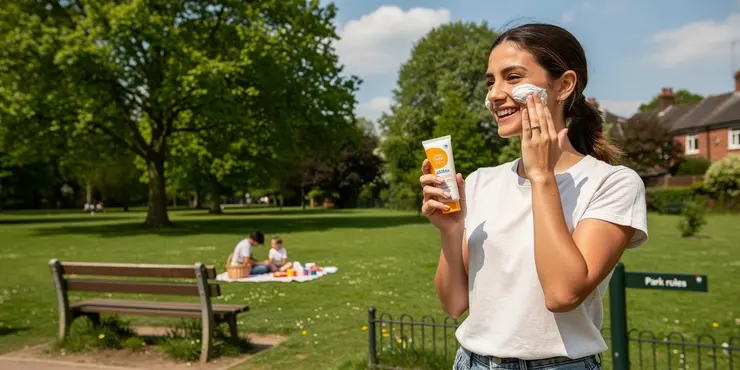
How does sunscreen with SPF 20 compare to SPF 50?
Relevance: 19%
-

Is a higher SPF always better?
Relevance: 19%
-

Why do some people not burn as easily as others?
Relevance: 19%
-
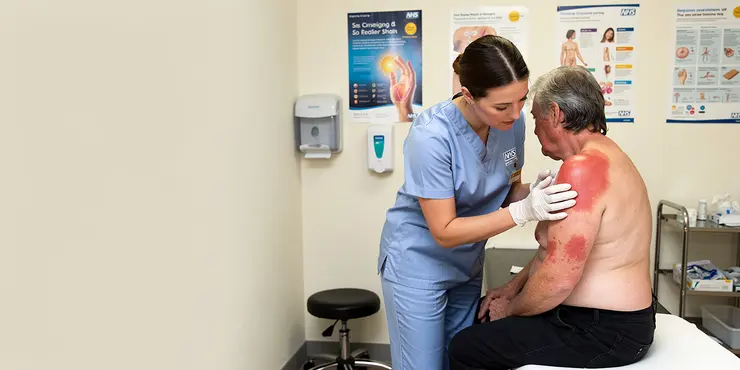
What are the symptoms of sunburn?
Relevance: 18%
-

Can sunburns cause permanent damage?
Relevance: 18%
-
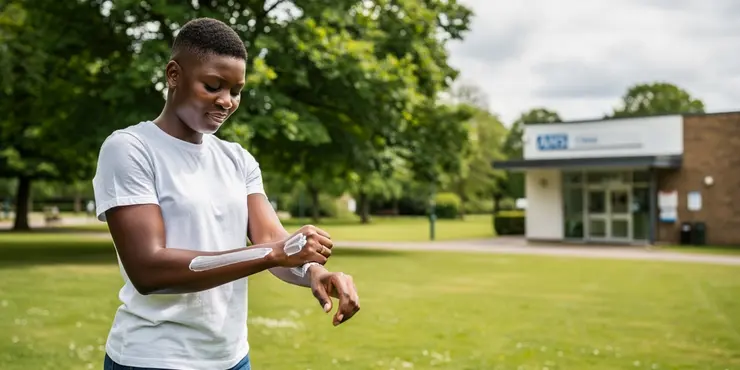
Can dark-skinned individuals get sunburned?
Relevance: 18%
-

What SPF level is recommended to prevent sunburn?
Relevance: 18%
-

Are some people more prone to sunburn?
Relevance: 18%
-
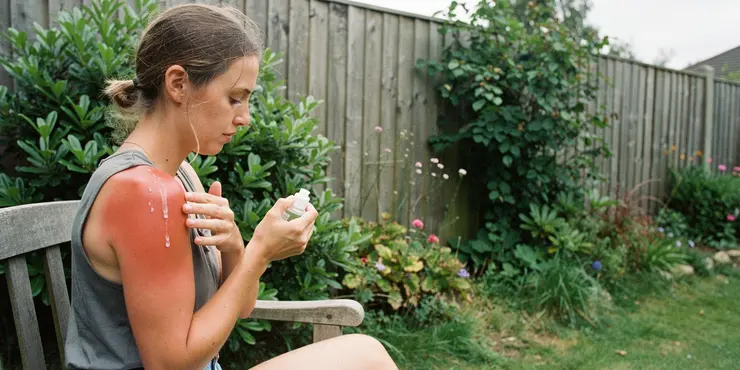
How is sunburn treated?
Relevance: 17%
-

What should I wear to stay cool in hot weather?
Relevance: 17%
-

How long does nettle rash last?
Relevance: 17%
-
Does tanning on sunbeds help the body produce vitamin D?
Relevance: 16%
-

Can tree nuts and peanuts cause cross-reactions?
Relevance: 16%
-

Can I get the COVID jab if I have allergies?
Relevance: 16%
-
Is it safe to sunbathe a baby with jaundice?
Relevance: 16%
-

What should I wear during a heatwave?
Relevance: 16%
-
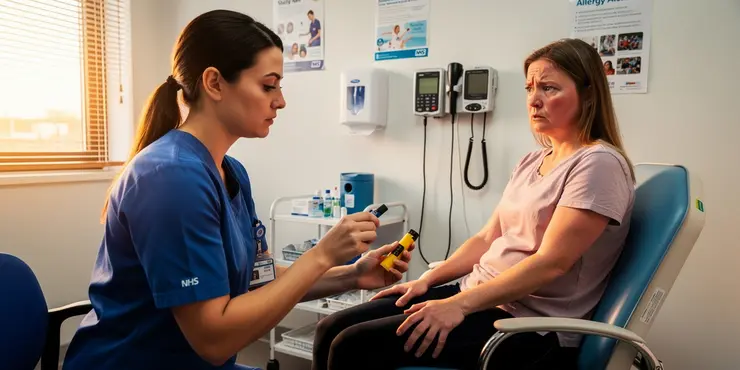
Is epinephrine the only treatment for severe nut allergy reactions?
Relevance: 16%
-
Does tanning on sunbeds reduce the risk of future sunburns?
Relevance: 16%
-
Can using a sunbed help strengthen my bones?
Relevance: 16%
-

What is sunburn?
Relevance: 16%
-
Can orange juice be allergenic?
Relevance: 16%
-

How long does it take for sunburn to appear?
Relevance: 16%
-

Do pets contribute to hay fever?
Relevance: 16%
-

Does tanning lotion prevent sunburn?
Relevance: 15%
-

How can I keep children safe during a heatwave?
Relevance: 15%
-
Do sunbeds offer any anti-aging benefits for the skin?
Relevance: 15%
-

Are nut oils safe for people with nut allergies?
Relevance: 15%
-

Can patients with drug allergies still take heart disease medications?
Relevance: 15%
-

What is a skin cancer screening?
Relevance: 15%
Is It Possible to Be Allergic to the Sun?
While it might sound unusual, it is indeed possible to have a reaction to sunlight. This condition is often referred to as sun allergy, and it encompasses various disorders related to an abnormal reaction to ultraviolet (UV) rays. Unlike typical allergic reactions, sun allergies are not caused by a response to an allergen. Instead, they involve the immune system reacting to changes induced in the skin when exposed to sunlight.
Types of Sun Allergies
There are several types of sun allergies, with Polymorphic Light Eruption (PLE) being the most common. PLE is characterized by an itchy rash that develops after sun exposure, typically occurring in spring or early summer. Solar urticaria is another form, which causes hives to develop after sun exposure, although it is less common. Photoallergic eruptions can occur when the skin has an adverse reaction to a chemical substance activated by sunlight, often involving medications or sunscreen ingredients.
Causes and Risk Factors
Sun allergies occur when the immune system classifies compounds in the skin altered by sunlight as foreign invaders, prompting an immune response. The exact cause of PLE isn't fully understood, but genetic predisposition plays a role, as it tends to run in families. People with lighter skin are generally more susceptible, and women are more frequently affected than men. Additionally, certain medications and topical products can increase photosensitivity, heightening the risk of a sun allergy.
Symptoms
The symptoms of sun allergies can vary based on the type and severity of the condition. Common signs include redness, itching, small bumps, or blisters on sun-exposed areas such as the neck, arms, and the back of hands. These symptoms typically appear a few hours after sun exposure and can last from a few days to weeks, depending on sun exposure and the body's response.
Diagnosis and Treatment
Diagnosing a sun allergy usually involves a review of medical history, an evaluation of the skin's reaction pattern, and sometimes laboratory tests. Dermatologists may perform phototesting or a biopsy to rule out other conditions. Treating sun allergies focuses on reducing exposure to UV rays by wearing protective clothing and using broad-spectrum sunscreen. In severe cases, prescription medications like corticosteroids may be used to manage symptoms. Desensitisation therapy or phototherapy might be recommended for individuals with recurrent incidents.
Prevention
Preventing sun allergies largely involves minimizing direct sunlight exposure and being aware of triggers. Staying indoors during peak sunlight hours, seeking shade when outdoors, and applying sunscreen even on cloudy days are practical preventive measures. It’s also advisable to take note of any substances or medications that could exaggerate sensitivity to the sun, making necessary adjustments to limit your risk. Proper skin care and protection can significantly manage symptoms and improve quality of life for those affected by sun allergies.
Can You Be Allergic to the Sun?
Some people can have a reaction to sunlight. This is called a sun allergy. Sun allergies happen when sunlight causes changes in your skin and your body reacts. It's not like normal allergies, which are caused by things like pollen.
Types of Sun Allergies
There are different kinds of sun allergies. The most common one is called Polymorphic Light Eruption (PLE). PLE causes itchy spots on your skin after you go out in the sun. This usually happens in spring or early summer. Another type is Solar Urticaria, which makes hives appear on your skin, but it is less common. Sometimes, your skin can react to chemicals in medicines or sunscreen when you are in the sun.
What Causes Sun Allergies?
Your body can think changes in your skin from the sun are bad. Then, it reacts to them. We don't fully understand why PLE happens, but it can run in families. People with light skin, especially women, get sun allergies more often. Some medicines can also make your skin more sensitive to sunlight.
Signs of Sun Allergies
Sun allergies can make your skin red, itchy, or bumpy. You might get small blisters. These signs usually show up a few hours after you've been in the sun, on places like your neck, arms, and hands. They can last from a few days to weeks.
How Are Sun Allergies Found and Treated?
Doctors look at your skin and check your health history to find out if you have a sun allergy. Sometimes they do special tests. To treat sun allergies, try staying out of the sun and wear protective clothes. Use sunscreen with broad-spectrum protection. If the allergy is severe, doctors might give you medicines to help. Some people might get special light treatments if the allergy keeps coming back.
How to Prevent Sun Allergies
To prevent sun allergies, try to stay out of the sun when it's very bright. Stay indoors or in the shade during those times. Even on cloudy days, wear sunscreen. Be careful with medicines that can make your skin sensitive to the sun. Taking care of your skin can help control symptoms and make life better if you have a sun allergy.
Frequently Asked Questions
Is it possible to be allergic to the sun?
Yes, it is possible to be allergic to the sun, a condition known as photosensitivity or solar urticaria.
What are common symptoms of sun allergy?
Common symptoms include redness, itching, blisters, or hives on areas of skin exposed to sunlight.
How is sun allergy diagnosed?
A sun allergy can be diagnosed through a physical examination, patient history, and specialized tests like phototesting or photopatch testing.
Can sun allergy be treated?
Sun allergy can be managed with protective measures such as using sunscreen, covering the skin, and in some cases, taking medications like antihistamines or corticosteroids.
Who is at risk for sun allergies?
Individuals with lighter skin, other allergies, or those with certain genetic predispositions may be more at risk for sun allergies.
What causes sun allergy?
Sun allergy can be triggered by an immune system reaction to sun-exposed skin, often related to genetic factors or sometimes exposure to certain chemicals or medications that increase sensitivity to sunlight.
Is sun allergy the same as sunburn?
No, a sunburn is a straightforward skin damage response to UV radiation, while sun allergy involves immune system reactions.
Can sun allergy develop suddenly in adulthood?
Yes, sun allergy can develop at any age, though it often first appears in young adults.
Are there different types of sun allergies?
Yes, common types include polymorphous light eruption, solar urticaria, and photoallergic reactions.
Is sun allergy hereditary?
There can be a genetic component, meaning it might run in families, but other factors also contribute.
Can certain medications cause a sun allergy?
Yes, some medications and topical applications can make the skin more sensitive to sunlight, potentially triggering an allergic reaction.
How can sun allergy be prevented?
Preventative measures include avoiding the sun during peak hours, wearing protective clothing, and applying broad-spectrum sunscreen.
Can dietary changes help manage sun allergy symptoms?
While there's limited evidence on diet directly affecting sun allergy, maintaining overall skin health with a balanced diet can be beneficial.
Is there a cure for sun allergy?
There is no cure, but symptoms can typically be managed effectively with lifestyle modifications and treatments.
Can sun allergy lead to other health complications?
While not typically dangerous, severe reactions can impact quality of life and require careful management.
How does phototherapy help with sun allergies?
Controlled exposure to UV light can sometimes desensitize the skin and reduce allergic reactions over time.
What is the difference between sun allergy and heat rash?
Sun allergy is an immune reaction to UV light exposure, while heat rash occurs due to blocked sweat glands and is not related to UV exposure.
Are certain skin types more prone to sun allergies?
Yes, lighter skin types are often more susceptible to sun allergies and sun damage.
Can over-the-counter skincare products affect sun allergy?
Some skincare products can increase sun sensitivity or trigger reactions, so it's important to choose products appropriate for sensitive skin.
Is it possible to outgrow a sun allergy?
Some individuals may experience a change in sensitivity over time, but many need to continue managing their symptoms lifelong.
Can you be allergic to the sun?
Some people have a problem with the sun. It can make their skin red and itchy. This is like being allergic to the sun.
If you think you might be allergic to the sun, talk to a doctor. They can help you.
To protect your skin, you can:
- Stay in the shade.
- Wear a hat and long sleeves.
- Use sunscreen.
Yes, some people can be allergic to the sun. This is called photosensitivity or solar urticaria.
What happens when you are allergic to the sun?
When your skin is in the sun, you might see these things: red spots, it itches, blisters (small bubbles with liquid), or bumps called hives.
How do doctors know if someone is allergic to the sun?
A doctor can find out if you have a sun allergy in a few ways. They will look at your skin, ask you questions about your health, and might do special tests.
These tests have names like "phototesting" or "photopatch testing." They help the doctor learn how your skin reacts to sunlight.
Tools like picture books or apps can help if you want to learn more about sun allergies.
Can sun allergies be fixed?
Some people get itchy skin or red spots from the sun. This is called a sun allergy.
There are ways to help:
- Wear clothes that cover your skin.
- Use special cream to block the sun. It's called sunscreen.
- Stay in the shade when the sun is strong.
- You can talk to a doctor for more help.
If you need help reading this, you can use special apps or ask someone to read it with you.
You can handle sun allergy by doing a few things. Use sunscreen to protect your skin. Wear clothes that cover your skin. Sometimes, taking medicine like antihistamines or corticosteroids can help too.
Who can get sun allergies?
Some people can get sun allergies more easily. This can happen if they have light skin, other allergies, or if sun allergies run in their family.
Why do some people have a sun allergy?
Some people get itchy skin from the sun. This is because their body reacts to the sun in a special way. It can happen because of the genes they get from their parents. Sometimes it happens when they use certain creams, medicines, or chemicals that make their skin more sensitive to the sun.
Is sun allergy the same as sunburn?
No, they are different.
Sun Allergy: When your skin gets itchy or bumpy from the sun.
Sunburn: When your skin becomes red and sore from too much sun.
Tip: Wear sunscreen and a hat when you go outside. This helps protect your skin from the sun.
No, they are not the same. A sunburn is when your skin gets hurt by the sun's strong rays. A sun allergy is when your body reacts because it thinks the sun is bad.
Can you become allergic to the sun when you are an adult?
Yes, anyone can get a sun allergy. It can happen at any age, but it often starts when you are a young adult.
If you find the sun makes your skin itchy or red, talk to a doctor. They can help.
Are there different kinds of sun allergies?
Some people get a rash when they are in the sun.
This is called a sun allergy.
There are different kinds of sun allergies.
If you get a rash from the sun, tell an adult or a doctor.
It can help to wear sunscreen, hats, and long clothes to avoid the sun.
Yes, there are a few common types:
- Polymorphous light eruption: This is a rash that happens when your skin is in the sun.
- Solar urticaria: These are red, itchy bumps that show up when you are in sunlight.
- Photoallergic reactions: This is when your skin has an allergic reaction because of the sun and certain skin products.
If the words are hard, try reading with a friend or asking an adult to read with you. You can also use tools like screen readers that read the text out loud.
Can you get sun allergy from your parents?
Some things can be passed down in families because of genes. But, there are other reasons that can cause it too.
Can some medicines make you more sensitive to the sun?
Some medicines can make your skin more sensitive to sunlight. This means you might get sunburned more easily.
Here are some tips to help:
- Ask your doctor or pharmacist if your medicine can make you sensitive to sunlight.
- Wear sunscreen, a hat, and sunglasses when you go outside.
- Try to stay in the shade, especially when the sun is very strong.
- If you notice your skin reacting to the sun, talk to your doctor.
Yes, some medicines and creams can make your skin more sensitive to sunlight. This might cause an allergic reaction.
How can you stop getting a sun allergy?
Try these tips to help:
- Wear a hat and long clothes when you go outside.
- Put on sunscreen to protect your skin.
- Stay in the shade when the sun is very strong.
- Wear sunglasses to protect your eyes.
Ask someone to help you with these steps if you need it. You can also use picture cards as a reminder.
To stay safe from the sun, you can do these things:
- Stay inside or in the shade when the sun is very strong.
- Wear clothes that cover your skin.
- Put on sunscreen that protects you from all types of sun rays.
Can changing what you eat help with sun allergy symptoms?
Sometimes, eating different foods can help if you have a sun allergy. Here are some tips:
- Try to eat lots of fruits and vegetables. They are good for your skin.
- Drink plenty of water to keep your skin healthy.
- Talk to a doctor about the right foods for you.
You can also:
- Use sunblock to protect your skin when you go outside.
- Wear a hat and long sleeves on sunny days.
Ask someone you trust to help you if you have questions.
We don't know a lot about food helping with sun allergies. But eating healthy food is good for your skin.
Can sun allergy be cured?
Some people are allergic to the sun. Their skin gets itchy, red, or bumpy. Doctors can help.
There is no magic cure. But here are things that might help:
- Wear sunscreen to protect your skin.
- Stay in the shade when the sun is strong.
- Wear a hat and long sleeves.
- Talk to a doctor for medicine or advice.
Tools that can help:
- Use apps to remind you to put on sunscreen.
- Listen to audiobooks about sun safety.
There is no cure, but you can usually feel better with changes in how you live and with treatments.
Can being allergic to the sun cause other health problems?
If you are allergic to the sun, you might get rashes or itchy skin. It is important to keep your skin safe. Here are some things to help:
- Wear sunscreen to protect your skin.
- Put on clothes that cover your skin when outside.
- Stay in the shade if you can.
If your skin feels very bad, talk to a doctor. They can help you feel better.
Severe reactions are usually not very dangerous, but they can make life harder. It is important to manage them well.
How does light therapy help with sun allergies?
Light therapy uses special lights to help people who are allergic to the sun. These lights are not like the sun and can make your skin feel better.
Here are some ways to make reading easier:
- Use your finger to follow the words as you read.
- Read out loud to hear the words.
- Ask someone to read with you if you need help.
Getting a little bit of sunlight can help your skin get used to it. This might stop you from having an allergic reaction.
How are sun allergy and heat rash different?
Sun allergy happens when your body reacts to sunlight. Heat rash happens when sweat gets trapped under your skin. Sun allergy is about sunlight. Heat rash is about sweat.
Do some skin types get sun allergies more easily?
Some people have skin that gets sun allergies more easily.
If you have light skin, you might get sun allergies faster.
Using sunscreen can help protect your skin.
Wearing hats and long sleeves can also keep your skin safe in the sun.
If the sun makes your skin itchy or red, a doctor can give you more advice.
Yes, people with lighter skin can get sun allergies and sun damage more easily.
Do store-bought skincare products change sun allergies?
Sun allergies make your skin react badly to sunlight. Some creams from the store can help or make it worse. Ask your doctor if you feel itchy or your skin turns red when you use a new cream.
To feel better, you can:
- Wear a hat and clothes that cover your skin when you go outside.
- Use sunscreen to protect your skin from the sun.
- Talk to a doctor if you get a rash or your skin feels bad.
Some skin products can make your skin more sensitive to the sun or cause skin problems. It is important to pick products that are safe for sensitive skin.
Can someone stop being allergic to the sun?
Sometimes, people can get less allergic to the sun as they grow older. It can be different for everyone. Talking to a doctor can help a lot.
Here are some things that can help:
- Wear sunscreen: Use sunscreen to protect your skin from the sun.
- Wear a hat and long sleeves: Cover your skin with clothes and a hat when you go outside.
- Stay in the shade: Try to stay in the shade when the sun is very bright.
- Ask a doctor: A doctor can give you advice and medicine if you need it.
Some people might feel different as time goes on, but many have to keep taking care of their symptoms for a long time.
Useful Links
This website offers general information and is not a substitute for professional advice.
Always seek guidance from qualified professionals.
If you have any medical concerns or need urgent help, contact a healthcare professional or emergency services immediately.
Some of this content was generated with AI assistance. We’ve done our best to keep it accurate, helpful, and human-friendly.
- Ergsy carfully checks the information in the videos we provide here.
- Videos shown by Youtube after a video has completed, have NOT been reviewed by ERGSY.
- To view, click the arrow in centre of video.
- Most of the videos you find here will have subtitles and/or closed captions available.
- You may need to turn these on, and choose your preferred language.
- Go to the video you'd like to watch.
- If closed captions (CC) are available, settings will be visible on the bottom right of the video player.
- To turn on Captions, click settings .
- To turn off Captions, click settings again.
More Items From Ergsy search
-

Is it possible to be allergic to the sun?
Relevance: 100%
-

Does Ozempic cause allergic reactions?
Relevance: 46%
-

Can UK spiders cause allergic reactions?
Relevance: 46%
-
Is pre-tanning in a sunbed a good way to prepare my skin for sun exposure?
Relevance: 44%
-

What is Sunburn?
Relevance: 21%
-

Can sunburn be prevented?
Relevance: 20%
-

What are the long-term effects of sunburn?
Relevance: 20%
-

Can makeup with SPF replace sunscreen?
Relevance: 20%
-

At what time of day is the sunburn risk highest?
Relevance: 19%
-

What SPF should I use if I am going to be outdoors all day?
Relevance: 19%
-

What are common side effects of antibiotics?
Relevance: 19%
-

How does sunscreen with SPF 20 compare to SPF 50?
Relevance: 19%
-

Is a higher SPF always better?
Relevance: 19%
-

Why do some people not burn as easily as others?
Relevance: 19%
-

What are the symptoms of sunburn?
Relevance: 18%
-

Can sunburns cause permanent damage?
Relevance: 18%
-

Can dark-skinned individuals get sunburned?
Relevance: 18%
-

What SPF level is recommended to prevent sunburn?
Relevance: 18%
-

Are some people more prone to sunburn?
Relevance: 18%
-

How is sunburn treated?
Relevance: 17%
-

What should I wear to stay cool in hot weather?
Relevance: 17%
-

How long does nettle rash last?
Relevance: 17%
-
Does tanning on sunbeds help the body produce vitamin D?
Relevance: 16%
-

Can tree nuts and peanuts cause cross-reactions?
Relevance: 16%
-

Can I get the COVID jab if I have allergies?
Relevance: 16%
-
Is it safe to sunbathe a baby with jaundice?
Relevance: 16%
-

What should I wear during a heatwave?
Relevance: 16%
-

Is epinephrine the only treatment for severe nut allergy reactions?
Relevance: 16%
-
Does tanning on sunbeds reduce the risk of future sunburns?
Relevance: 16%
-
Can using a sunbed help strengthen my bones?
Relevance: 16%
-

What is sunburn?
Relevance: 16%
-
Can orange juice be allergenic?
Relevance: 16%
-

How long does it take for sunburn to appear?
Relevance: 16%
-

Do pets contribute to hay fever?
Relevance: 16%
-

Does tanning lotion prevent sunburn?
Relevance: 15%
-

How can I keep children safe during a heatwave?
Relevance: 15%
-
Do sunbeds offer any anti-aging benefits for the skin?
Relevance: 15%
-

Are nut oils safe for people with nut allergies?
Relevance: 15%
-

Can patients with drug allergies still take heart disease medications?
Relevance: 15%
-

What is a skin cancer screening?
Relevance: 15%


